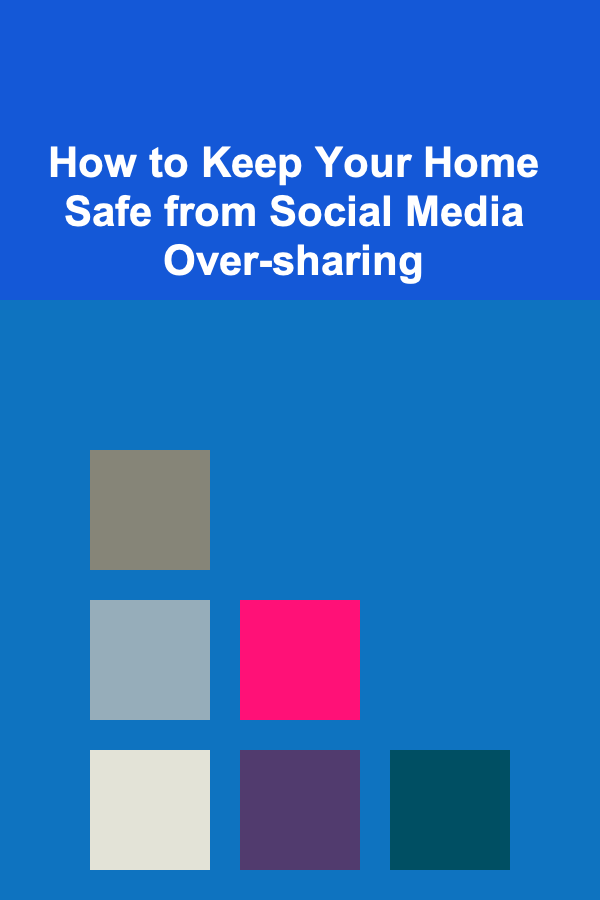
How to Keep Your Home Safe from Social Media Over-sharing
ebook include PDF & Audio bundle (Micro Guide)
$12.99$5.99
Limited Time Offer! Order within the next:

Social media has become an integral part of our lives. From Facebook to Instagram, Twitter, and newer platforms like TikTok, sharing moments from our personal lives has become almost second nature. While social media allows us to connect, express ourselves, and share experiences with friends and family, it can also present serious risks if not used wisely---especially when it comes to home security.
The phenomenon of social media over-sharing can expose you and your family to various threats. By sharing too much personal information, such as your whereabouts, travel plans, or the status of your home, you inadvertently make your property more vulnerable to burglars and other malicious individuals. These dangers are often underappreciated until it's too late. In this article, we'll explore how social media can jeopardize your home's security and provide practical advice on how to protect yourself by using social media responsibly.
The Dark Side of Social Media Sharing
Social Media as a Tool for Burglars
The key issue with social media over-sharing is that it often provides burglars with a roadmap to your home. Posting about your vacation, a work trip, or any event that leaves your home unoccupied can signal to potential criminals that now is the time to strike. The unfortunate reality is that burglars often turn to social media to gather information about their targets. Your posts, photos, and status updates can unwittingly tell them when you'll be away, where you live, and who is likely to be home or not.
This kind of over-sharing can take on various forms:
- Location Check-ins: By checking into a restaurant, airport, or another place, you are essentially broadcasting your whereabouts to everyone on your friends list---and potentially beyond if privacy settings aren't managed properly.
- Vacation Announcements: Posting about an upcoming trip or sharing vacation photos can signal that your home is empty for an extended period, giving burglars a clear window of opportunity.
- Family and Friend Updates: Sharing your family members' activities, where they live, or personal details can also give criminals insights into who to target and when.
- Real-Time Posts: Posting in real-time about your activities, such as what you're doing or where you're going, can immediately let potential criminals know that your home is vacant.
All of these factors contribute to what can be seen as an invitation to intruders looking for an easy opportunity.
The False Sense of Security
People often feel that by setting their social media profiles to "private," they can safeguard themselves from such risks. While adjusting privacy settings is important, it's not foolproof. Many people still leave themselves vulnerable by posting too much personal information, using public hashtags, or accepting friend requests from individuals they don't know personally.
Moreover, the nature of social media means that people often have hundreds, or even thousands, of "friends" or followers---many of whom are strangers or only casual acquaintances. Even if your posts are visible only to those in your close circle, it's important to understand that information can easily be shared, screenshot, or forwarded, potentially reaching an audience beyond your intended one.
Scams and Phishing
In addition to burglaries, social media can also expose you to various scams and phishing attempts. Hackers may use social media to gather information about you, such as your place of work, pet names, or the street you live on, which can later be used to create convincing phishing emails or phone calls.
The Risk of Over-Documenting Your Home
Sometimes, it's not the details about your whereabouts that pose a threat but the amount of information you provide about your home itself. For example, posting images of your newly renovated kitchen, home office, or backyard can reveal the layout and security weaknesses of your home.
While sharing photos of your home may seem innocent, a savvy criminal could glean important details from these posts---such as the location of your back door, your security system's placement, or the types of locks on your windows. Over-sharing such images may also make your home seem like an easy target, increasing the chances of it being broken into.
Steps to Safeguard Your Home from Social Media Over-sharing
Now that we've established the potential risks, let's explore how you can take proactive measures to keep your home safe while using social media. The key is awareness and control. By being intentional about what you share, who you share it with, and how much personal information you put online, you can significantly reduce the risks associated with social media over-sharing.
1. Manage Your Privacy Settings
The first step in protecting your home from social media over-sharing is adjusting your privacy settings on each platform. Each social media platform offers different levels of privacy controls, but the goal is to limit who can see your posts.
- Facebook: On Facebook, make sure your posts are visible only to your friends or specific groups. Avoid making posts public, as this exposes your information to everyone, including potential criminals. Use the audience selector tool to control who can view each individual post.
- Instagram: Instagram accounts should be set to private, meaning only people you approve can follow you and see your posts. Be mindful of who you accept as followers, as it's easy for strangers to follow your account if your settings aren't properly configured.
- Twitter: While Twitter is traditionally a public platform, you can make your account private by switching it to "Protected Tweets." This limits your audience to only people who follow you.
- TikTok: Like Instagram, TikTok also allows you to make your account private. This prevents strangers from seeing your videos, which could otherwise reveal information about your location or habits.
In addition to your general privacy settings, avoid oversharing sensitive details. Review who has access to your posts and regularly clean up your friend or follower lists by removing people you no longer interact with or trust.
2. Avoid Broadcasting Your Location
Location check-ins may seem harmless, but they can leave your home open to attack. In fact, many burglars have confessed to using location-based services to target homes when their owners are away.
- Refrain from check-ins: Avoid checking into locations like restaurants, bars, airports, or hotels, especially when you're out of town. You can always share your experiences later, once you're back home.
- Turn off location services: Most smartphones and apps track your location by default. Make sure to turn off location services in the apps that don't require it. By doing this, you'll reduce the chance of your exact whereabouts being shared publicly.
- Share your location privately: If you feel the need to share your location with friends, do so in private messages rather than posting publicly.
3. Be Mindful of Real-Time Sharing
Real-time sharing, such as posting photos and updates while you're still away from home, can put you at a higher risk of burglary. Wait until you return home to share updates or photos. By doing so, you ensure that potential criminals don't know when your home is empty.
- Delay posts: Instead of sharing photos and status updates in real-time, wait until you're back home. You can use scheduling tools to post content later, allowing you to control when and how you share personal information.
- Use caution when sharing live videos: Live streaming events and sharing real-time updates can create security risks, especially if you're showcasing your home or telling the world where you are at that exact moment.
4. Avoid Sharing Detailed Information about Your Home
While it's tempting to show off your new kitchen, living room, or other renovations, posting detailed photos of your home can reveal security vulnerabilities and allow burglars to plan their break-ins.
- Limit images of your home: Instead of posting wide-angle photos that show the interior of your home, consider sharing more generalized photos of yourself or landscapes. Keep your home's details, like the arrangement of furniture or your security system, private.
- Don't share security system info: Posting about the security features in your home, such as cameras, alarm systems, or smart locks, could give criminals valuable information about your security setup. Avoid sharing such details on social media.
5. Avoid Revealing Personal Details
Be cautious about the personal information you share. Many social media users post updates about family members, friends, and their daily routines. These posts can be used by criminals to exploit personal information or build detailed profiles.
- Limit the information you share about family and friends: Refrain from sharing information about where your spouse, children, or other family members are going, especially if it involves a trip or event.
- Be cautious about revealing routines: Criminals can use details about your daily habits---like when you go to work or when your kids leave for school---to learn your schedule and identify when your home is empty.
6. Educate Your Family Members
It's important to make sure that everyone in your household is aware of the risks of over-sharing on social media. Set guidelines for what can and cannot be posted online, and encourage responsible social media usage.
- Talk to your children: If you have children, teach them about the importance of privacy on social media. They may not be aware of the risks of oversharing, so it's essential to explain how posts can impact the security of your home.
- Establish family rules: Set rules regarding what personal details can be shared, when and where it's appropriate to share photos, and how to handle privacy settings on devices.
Conclusion
Social media is a powerful tool that brings people together, but when used carelessly, it can also pose significant risks to your home and personal safety. By being mindful of what you share, adjusting your privacy settings, and teaching your family members about responsible social media use, you can significantly reduce the chances of your home becoming a target for burglars. Protecting your home from social media over-sharing is a small but crucial step in ensuring the safety and security of both your property and loved ones.
Reading More From Our Other Websites
- [Stamp Making Tip 101] Step-by-Step Guide: Making Custom Rubber Stamps with a Hot Glue Gun
- [Home Cleaning 101] How to Properly Care for Your Cleaning Tools
- [Home Budget Decorating 101] How to Update Kitchen Cabinets Cheaply: Beyond Paint -- Exploring Peel-and-Stick Options for a Quick Refresh
- [Polymer Clay Modeling Tip 101] Eco-Friendly Tips: Sustainable Practices for Polymer Clay Jewelry Makers
- [Home Cleaning 101] How to Remove Odors from Your Home and Keep It Fresh
- [Beachcombing Tip 101] Unearthing the Hidden Gems: 10 Unexpected Beach Treasures You Can Find on Your Next Walk
- [Tie-Dyeing Tip 101] Mindful Artistry: Using Tie-Dye Mandalas for Meditation and Relaxation
- [Home Soundproofing 101] How to Soundproof a Home Gym to Keep Noise Down
- [Home Budget Decorating 101] How to Upcycle Low-Cost Furniture: Transforming Bargain Finds into Stylish Pieces
- [Tie-Dyeing Tip 101] Best Tie‑Dye Techniques for Vintage Denim Revival

How to Clean Your Dishwasher for Optimal Performance
Read More
How to Create a Dramatic Lighting Effect in Your Living Room
Read More
How to Make Money Online as a T-shirt Designer: 10 Actionable Ideas
Read More
How To Understand the Philosophy of Human Nature
Read More
How To Learn to Arrange Music for Ensembles
Read More
How To Apply Kantian Ethics to Moral Dilemmas
Read MoreOther Products

How to Clean Your Dishwasher for Optimal Performance
Read More
How to Create a Dramatic Lighting Effect in Your Living Room
Read More
How to Make Money Online as a T-shirt Designer: 10 Actionable Ideas
Read More
How To Understand the Philosophy of Human Nature
Read More
How To Learn to Arrange Music for Ensembles
Read More